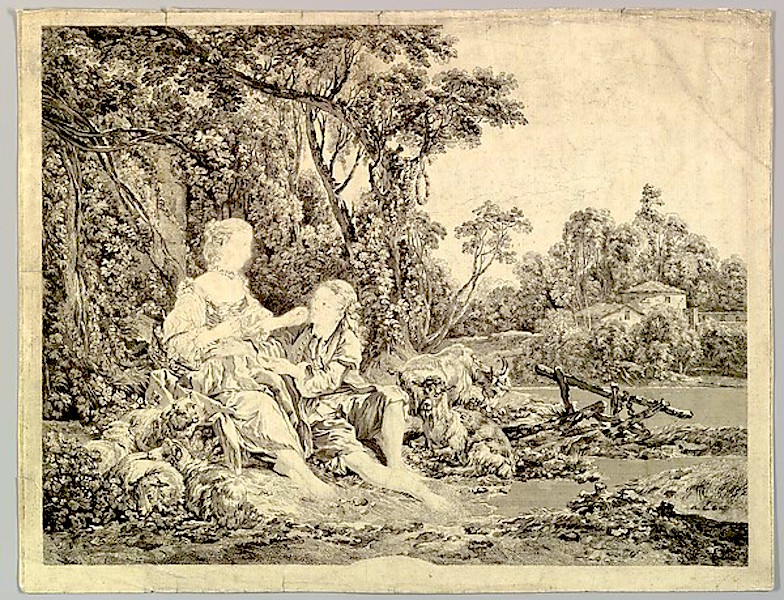
La Maréchale d’Aubemer, Nouvelle du XVIIIème Siècle, or The Widow of Field Marshal d’Aubemer: A Novella of the 18th Century, posthumously published in 1867, is a novel by the author and memoirist Madame de Boigne, born Adélaïde d’Osmond (1781-1866). Mine is the first English translation, available here for the first time anywhere.
In Chapter 14, the Maréchale, Gudule, and Henri are reunited at Magnanville.
THE WIDOW OF FIELD MARSHAL D’AUBEMER: A NOVELLA OF THE 18TH CENTURY
CHAPTER FOURTEEN
Return to Magnanville
Seven months had passed since Lionel’s death; the old Marquis was still grieving the father of the great-grandchildren he had hoped for, and the Baronne her adored son, despite the embarrassment in which he had placed her. Not only had Lionel had spent all of his paternal inheritance, but she had had to make large sacrifices of her own fortune, to which her daughter-in-law renounced her rights.1 Gudule thus found herself once again the heiress to the slender means of the Saveuse battlements, but she also rediscovered the warblers and roses of her native mountains, as buoyant and fresh as she. Mme de Saveuse felt in the depths of her soul a wellspring of happiness unknown to her until then, which made her still more beautiful and revealed itself in her smallest actions. Since the confidences interrupted by such an unforeseen event, by which Gudule had been staggered, d’Estouteville’s name had passed neither the Maréchale’s lips nor her niece’s, but both thought of him ceaselessly, and the suspicion that the other was thinking of him was mutual. On the pretext of thanking Mme d’Aubemer for her goodness in asking for news of him, d’Estouteville had written to her and an increasingly active correspondence developed between them. His letters, like many others, were handed to Gudule, but she handed them back without comment. However, her aunt noticed that on those days her affection for her loved ones was even more effusive and her gaiety more free.
It was not without keen regret that Mme d’Aubemer decided to leave Saveuse; her long stay there had flowed past like a dream. Surrounded by attention and affection as she was, the days seemed much alike, but since they were diversified by varied occupations, they seemed to her to be sufficiently full. She almost admitted to herself that there comes a time of life when monotony is not dullness, but rather repose. The mountain air was good for her, and above all the feeling of isolation from which she usually suffered was held at bay; with her sister, she could speak of their youth and friends of times gone by; with Gudule, she could speak of her present relations. The old marquis himself had perfect recall, and, having served in the musketeers, linked his memories of former times with the Maréchale’s more recent ones, who thus felt herself growing younger in her own eyes. A number of neighbours, some of them rather likeable, frequently joined the family circle and soon enough seven months had passed very agreeably. All the same, the thought of spending the winter out of Paris horrified the Maréchale. Such a thing had never happened and seemed impossible to contemplate. Still, she delayed her departure from one day to another. The first snowfall brought home to her that she could no longer put off the fatal hour. She would very much have liked to take her niece with her, but Gudule wanted to finish her year of mourning at Saveuse, and the Maréchale very sadly had to concede that it was perhaps more suitable to do so.
Taking messages for various people, the Maréchale asked her, “Shall I say nothing to Henri d’Estouteville?”
“No, Aunt,” replied Gudule, blushing. “Not yet!” she replied in a lower voice, smiling gently.
The Maréchale clasped her to her breast.
“Well then,” she responded gaily, “I shall speak only for myself, but I shall say a great deal, I warn you!”
Gudule did not object. This name, which she had just heard for the first time in months, had echoed so agreeably in her heart that she took to repeating it aloud to herself, and its owner thus populated the solitude that the Maréchale’s absence created. No doubt her mother was as dear to her as ever, but she did not know Henri, and she did not know about her relations with him. Gudule would not have lacked the confidence to broach the subject, but what would she have said? One day they looked at each other for the duration of a second, and that day was the eve of Lionel’s death. The Maréchale for her part, a bit ashamed of having for one moment exposed a young woman confided to her care to a foreseeable danger, to which she had then turned a blind eye, was in no wise keen to speak of the matter to her sister, and the secret remained between Gudule and her aunt.
Hardly had Mme d’Aubemer arrived in Paris when M d’Estouteville ran to see her; he came back the next day and every day. A subject never lacked for their conversations, and the letters she wrote to Saveuse were full of him. Peeling off the varnish of frivolity that he had been known for, Henri had acquired his full intrinsic worth. While keeping the social graces that had brought him into fashionable favour, he attached less worth to the success that they procured for him, and he became a serious and moral man. His feelings for Mme de Saveuse, in purifying his heart, had also cleared his mind. The Marquis d’Estouteville was somewhat alarmed by what he termed his son’s sudden fit of misanthropy, but he attributed it to the rupture with Princesse Simon and counted on a new flirtation to pull him out of it. As for Princesse Simon, she had not troubled herself to weep for Lionel; after having vainly expended all her effort on recapturing Henri, she had attached herself to a handsome, magnificently prodigal foreigner, whose entertainments she took in hand, thus procuring for herself a new source of distraction and social success. She was absorbed in this new pursuit and forgot about Henri. The latter, as ignorant as Gudule of the trap that the Princesse’s malice had only just missed opening under their feet (for poor Lionel had taken the secret of it to the tomb with him, and the Maréchale thought better of repeating the information that had been revealed to her), bore her no ill will and encountered her in society with complete indifference.
Despite Henri’s attentions and her friends’ efforts, the Maréchale took up her home life again with a redoubled feeling of loneliness. Visits, agreeable as they may be, do not make up for the habitual rhythms of family life. Mme d’Aubemer felt the difference keenly and thought of nothing but how to secure a family life for herself in the future. Tedium brought back her old suffering, and once the winter was finally over, she loudly demanded her niece’s return. The good Caroline, always ready to sacrifice herself, did not oppose the Maréchale’s wishes, and, why not admit it, Gudule herself was not at all recalcitrant. The anniversary of Lionel’s death had passed, there were only six weeks left of her mourning,2 and Mme d’Aubemer proposed spending them at Magnanville. Magnanville recalled sweet memories that Mme de Saveuse now permitted herself to acknowledge and it was with real satisfaction that she found herself there again in the last days of April. Gudule was still more charming than on her first arrival in Paris: to the calm and serene, yet strong, expression of her physiognomy had been added that of a more intimate sensibility, and her sufferings, though they were completely forgotten, had fortified her beauty. Her sojourn at Saveuse had given her twenty-two years the freshness of nineteen, and her time in Paris among the best company had given her that bloom of elegance that she had party intuited, but that cannot fully be cultivated except in that rarefied soil. The Maréchale never tired of looking at her niece, and rejoiced in her effect on several of her old admirers who had gathered at Magnanville.
The next day after her arrival, Gudule was in the Maréchale’s sitting room, which looked out onto a long avenue. Perceiving, quite far off, a galloping horseman advancing at great speed, both ladies approached the window.
“I can’t help trembling, seeing him on horseback,” said Gudule.
“In joy or fear?” replied the Maréchale laughingly.
“Perhaps both!”
“Would you like us to go receive him in the drawing room?”
“No, Aunt, I would prefer that he come here.”
Henri had meanwhile arrived at the foot of the steps to the chateau, thrown the reins to one of the Maréchale’s men, his own still following behind, and run up the steps. The ladies, observing him, took up their places once again and awaited his entry in silence; several minutes having passed, and after having exchanged looks of astonishment, they gave voice to it in words: What could have become of him?
The Maréchale had a good mind to ring and ask, but Gudule restrained her. “Perhaps, disheveled after his ride, he has gone to freshen up.”
“Oh, Aunt!”
“Now don’t upset yourself. No doubt the excitement made him faint, and he’s lying on the other side of the door. Would you like me to go and see?”
Gudule would have preferred the latter version to the former, but in fact neither was accurate. Henri, anxious about not being able to master his feelings and fearful of displeasing Mme de Saveuse, had stopped short at the threshold of the sitting room in which he knew the ladies to be alone, and made for M Chevreux’s room, wanting to bring in the naive old savant, who would certainly not see the meaning of what was said, as a witness to an interview that his presence would necessarily render more calm. The time taken by M Chevreux to arrange his papers had caused the delay at which aunt and niece were so astonished, but, seeing Henri enter still all covered in dust, Gudule shot a look of triumph at her aunt.
But for a touch of vermilion on their cheeks, followed by a good deal of pallor, and but for a slight trembling of the voice while uttering insignificances, there was nothing remarkable about the meeting of the young people, and the Maréchale, who took a vivid interest in their love, was rather disappointed.
Henri did not know what progress he had made in his absence and his silence. He still feared that disdain from which he had suffered so much, and was braced in all seriousness to combat those prejudices that his former life could have inspired against him. In making off with his heart, true love had also banished his confidence in success and it was in all sincerity that he found himself intimidated in front of the “little provincial.” How long would it take for him to realize his new position? That is what no one could have said, but only a few days had passed when the playing field between them was leveled. No definite word had yet been uttered, but they knew that the wedding would take place at Saveuse during the summer. Gudule’s grey dress2 did not permit any open advances or any definite engagement, and this unspoken understanding sufficed for a happiness of which Mme d’Aubemer was the benevolent confidante on both sides.
Princesse Simon, with her instinct for malice, was the first to catch wind of what was happening at Saveuse. The marriage of Henri to Mme de Saveuse was odious to her, and she wanted to prevent it. Encountering the Marquis d’Estouteville, she spoke to him with apparent friendliness of the affectionate interest she still took in his son, and of the regret she felt at seeing him on the verge of committing a folly that he would repent. Comtesse Lionel de Saveuse was quite pretty, but she was a prudish and benighted provincial with no experience of the world who would not know how to uphold her rank at court, nor in Paris. She had no fortune; her aunt was rich, to be sure, but Princesse Simon had it from her mother-in-law, the Maréchale’s intimate friend, that she would never consent to do anything for her niece in the marriage contract, and everyone knew how capricious Mme d’Aubemer was in her affections. She trembled to see Henri committed to making this mis-step, but it was up to the Marquis to do something about it. The latter, indeed, remembered hearing several people mentioned as standing a chance of inheriting the Maréchale’s fortune, and accepted the Princesse de Montford’s denuciation the more easily; it also explained his son’s new line of conduct. This putative marriage upset his plans too much for him not to promise to prevent it. The moment had come to conclude the long-projected alliance with the little Comtesse de Toreignstein. He had been to see her in Caen. She was only slightly deformed, her complexion was fresh enough, and she was a good deal less ugly than he had feared; with her lovely eyes and a more flattering wardrobe than that of the convent she would be quite passable. The Marquis had come back charmed when the Princesse’s confidence disrupted his calculations and left him annoyed, for, apart from what little remained of his own fortune and the incertitude of the Maréchale’s dispositions, he felt an extreme repugnance to spell out the state of his affairs to a strange family.3 His anxiety was thus great when a letter came from Magnanville to confirm Princesse Simon’s words.
Henri passionately recounted his long attachment to Mme de Saveuse. Her long period of mourning have coming to term, he asked for his father’s consent to a marriage that would assure his happiness for life, but in such a fashion as to make plain his determination to win through. The Marquis did not miss a step, for he had had time to meditate on his response. Here it is:
Despite the exaggerated terms in which you write, my dear Henri, I am very well-disposed to admire your ‘guardian angel.’ I have seen Mme de Saveuse, and she seemed very pretty to me; you say she is full of virtues and graces, and I believe it; she is very well-born and I would have nothing to say against this choice if, during our discussion soon to be almost four years ago, you had said, ‘All I need is an income of twelve hundred a year and my girl!’ — and if, since then, you had regulated your life on this principle. However, my dear child, you have acted quite differently. To my extreme regret, therefore, I must show you things as they really are, and you can judge for yourself. My consent is assured, whatever you decide.
Placing my confidence in your word, I had the weakness to draw on my ward’s capital for your expenses as well as mine — for, far from rejecting solidarity, I claim it. It was easier to see my way to procuring the funds in this way than to part with the lands that should eventually pass to your children. This weakness, which your marriage would have covered up and legitimized, in a sense, has become an offence that is all the more unpardonable for that the appeals to her fortune have been more numerous than I had imagined. I received your letter the day before yesterday, and since then I have spent more than thirty hours going over the impenetrable figures in the ledgers again and again. I still find that there are four to five hundred thousand francs that I do not possess which must be reimbursed to Mlle de Toreignstein. On your side, see where you stand with your mother’s inheritance, and see if you can help me. Ruin I am prepared for, but dishonour I would prefer to avoid. One doubtless always has recourse to the Trappists or the river; all the same, since these means are not very agreeable, one must not have recourse to them except in the last extremity. If you can come up with the sum that I need, and if, after you have dutifully explained our position to her, Mme de Saveuse accepts your hand without any fortune, I will receive with admiration the charming daughter-in-law you have promised me. I think it would be indelicate and quite imprudent to appeal to Mme d’Aubemer; from what we know of her, such an appeal would displease her excessively and probably cost Mme de Saveuse her good graces.
My dear Henri, I have had to outline for you this exact picture of our situation; it is now up to you to fill it in. One very precious consolation remains for me in all of this: Whatever happens, your name is not compromised in any way. That is only justice, for you have not been involved in any of these transactions, and you were unaware of the source of the money you were spending. No shame, then, can redound on your head, and you may be quite sure that I will act in such a way as to keep you completely in the clear. It grieves me to have to make such painful revelations to you; you could, nonetheless, have perhaps foreseen them from what I told you of our affairs on your return from Germany. If I may still be permitted to give you some advice, my dear son, it is to think of the future. Consider how I am suffering today, to find myself forced to cloud your happiness! Never have I so much regretted the shortcomings of a fortune which your mother’s excessive generosity began to bring into disorder; however, my dear child, we cannot complain of so much virtue, and cannot refuse the engagements she entered into. To sum up, dear Henri, if you are able, help me; if that is impossible, let me take care of things as best I can on my own. Accept my blessing in advance, and eternally keep secret what I have confessed to you. As far as the world knows, you must never have had any knowledge of it.
The Marquis smiled to himself on finishing this letter. He knew that his late wife’s fortune had nearly been dissipated, and that Henri would be unable to raise a sum of any importance. He knew his son well enough to be assured that the less he asked of him, the more he would obtain, and he expected a complete success from his perfidious self-sacrifice. Matters were less grave than he had portrayed them; his lands were indeed heavily mortgaged, but the entailments4 remained, and the little Toreignstein’s capital could not be touched. All the same, the Marquis had grasped that only a question of honour could sway Henri.
Poor Henri was waiting for his father’s reply without any great sense of suspense. Absorbed in his happiness, he lived under the spell of Mme de Saveuse’s gentle smile: that was his present and his future, and he could not tear his thoughts away from it. After a walk during which he had without much trouble obtained permission to write to the Marquis de Saveuse to ask for his grand daughter’s hand, Henri, in transports of joy, hurried to his room to dash off this letter. His father’s was waiting for on the writing table. A migraine served as a pretext for M d’Estouteville not to reappear in the drawing room that evening. At five in the morning, he left Magnanville. On entering Mme de Saveuse’s room, her chambermaid handed her a note that was hardly legible, so shaky was the handwriting:
I would be the worst of men if I were not the most despondent. I am leaving. Do not judge me with the inflexibility of your mind, but with the indulgence of your heart. Gudule, my God! Am I then reduced to such a prayer? Gudule, my beloved Gudule, forget this unfortunate man…
Henri.
At almost the same instant, a courier arrived from Saveuse: the old marquis had fallen gravely ill and the Comtesse Lionel’s immediate presence was requested; she decided to leave on the spot. This incident sufficed to explain her niece’s deeply troubled state to the Maréchale. The preparations for the journey were made in a state of febrile activity, and it was only when she noticed Henri’s absence at the moment Gudule was getting into the carriage that Mme d’Aubemer learned that he had left for Paris that morning. It was too simple a circumstance to cause her any surprise; she asked her niece if she had written to him, but Gudule gave no answer and the carriage set off. The Maréchale remained on the steps, admiring the filial anxiety that overrode all other feelings, yet promising herself not to vaunt it to Henry on his return, which she assumed would be that evening or the next morning.
Mme de Saveuse had authorized her aunt to open the letters that came for her, not expecting any but from Saveuse to give her news of her grandfather. The Maréchale inadvertently opened one from Paris. It was unsigned and contained a narrative as perfidious as it was untruthful about the death of Lionel de Saveuse, affirming that he had been killed by the hand of an assassin bought and paid for by Henri d’Estouteville. There was proof, and if his marriage with Mme de Saveuse took place, it would be furnished not only to her, but to the whole world, for such an awful scandal could not go unpunished. The breaking off of the marriage would assure that the truth would be kept an eternal secret.
The Maréchale assigned to this funereal piece of work, in which she thought she recognized the slightly disguised handwriting of the Princesse de Montford, the scorn that it deserved. Nonetheless, she could not help making a connection between this diabolical intervention and Henri’s prolonged absence, and she began to worry.
Notes:
- Gudule renounced her widow’s portion, presumably.
- Widows were customarily in full mourning for one year, and then half-mourning for six weeks. While in half-mourning, they could wear muted colours such as grey and violet.
- The Marquis would have to reveal all the details of his finances to the notaries who would draw up the marriage contract. This document, akin to modern pre-nuptial agreements, except that it also specified the terms of the customary dowry, was the norm among families of property.
- entailments — legal safeguards that property could not be alienated


















Leave a Comment